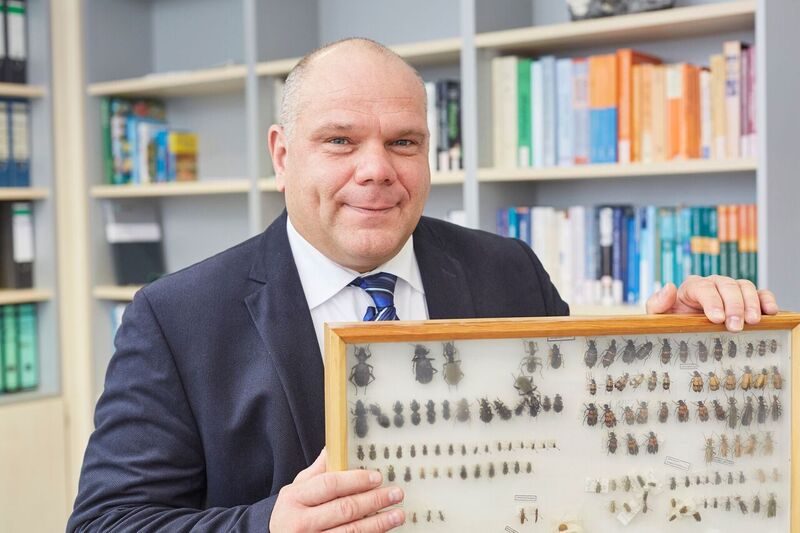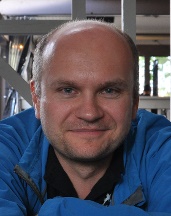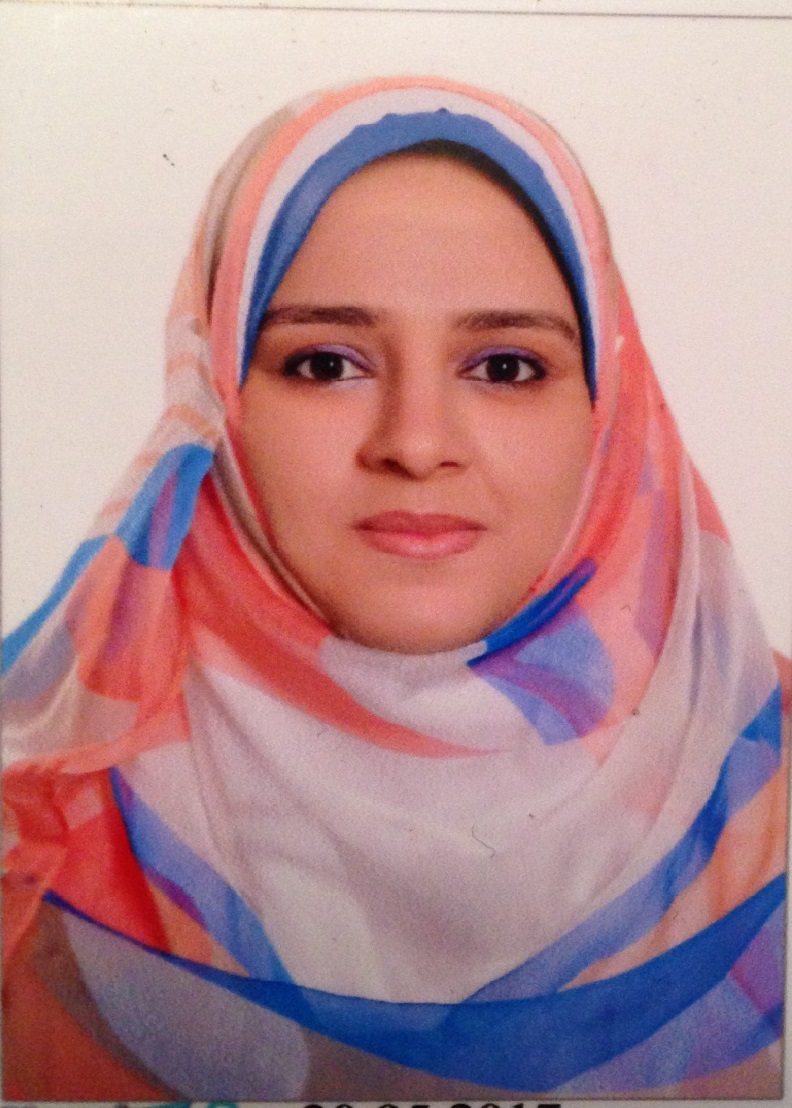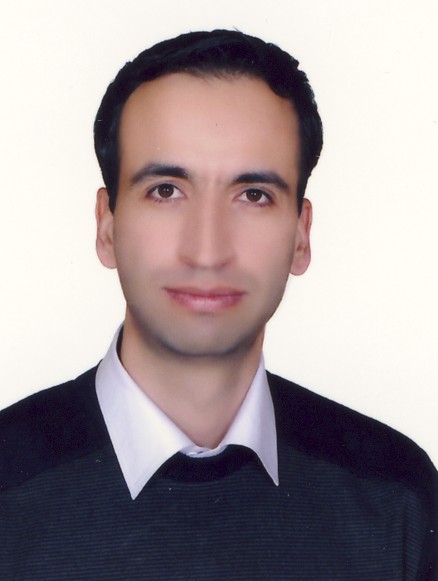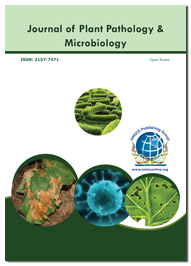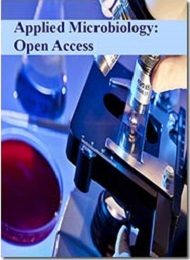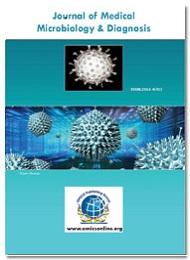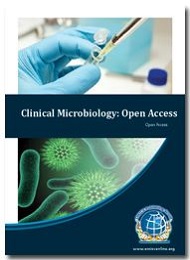Theme: “Empowering microbial interactions-its evolution, diversity and role â€
Microbial Interactions 2017
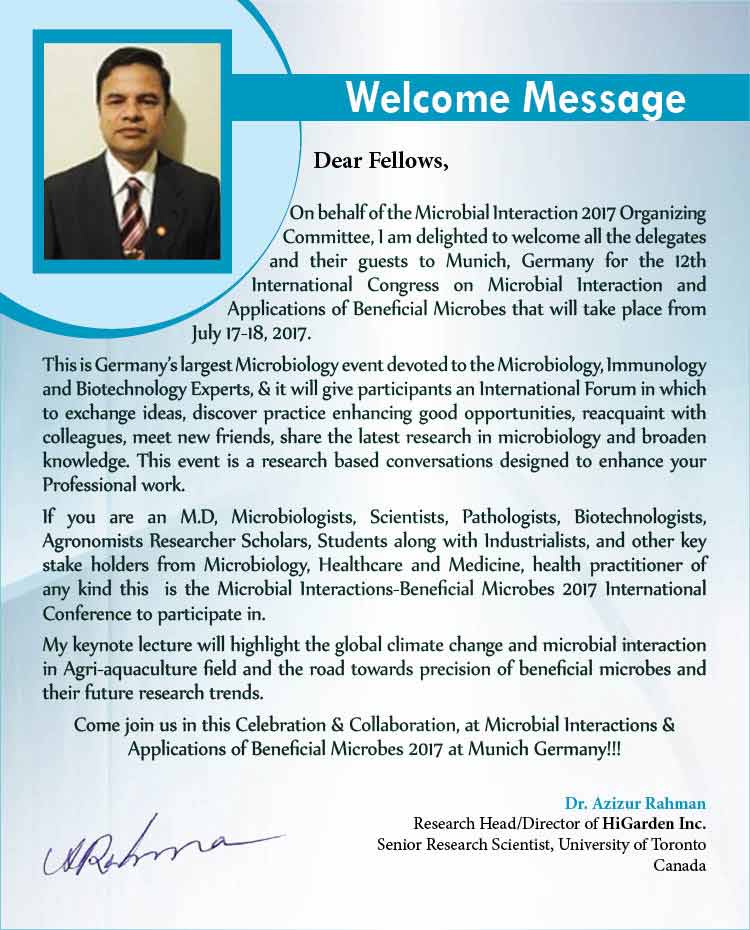
Summary:
Microbial Interactions 2017 is the premier event that brings together a unique and international mix of experts, researchers and decision makers from both academia and industry across the globe to exchange their knowledge, experience and research innovations. The scope of Microbial Interactions 2017 is to bring the advancements in the field of microbiology and different microbial cooperation with other organisms or within themselves. Microbial Interaction processes include coupling across a large range of scales and linkage between a numbers of factors of different nature.
The field of microbial cooperation has grown enormously over the last decade, leading to improved experimental techniques and a growing awareness of collective behaviour in microbes. Cooperation presents a fundamental challenge to customary evolutionary thinking. Microbes present a unique opportunity for scientists interested in the evolution of cooperation because of their well characterized and simple genetics, fast generation times, and easily manipulated and measured interactions. While these advantages are often well appreciated, other differences between organisms of the microscopic and macroscopic world are sometimes forgotten when transferring ideas and methods from the study of animals to that of microbes.
The Organizing Committee is gearing up for an exciting and informative conference program including plenary lectures, symposia, workshops on a variety of topics, poster presentations and various programs for participants from all over the world. We invite you to join us at the Microbial Interactions 2017, where you will be sure to have a meaningful experience with scholars from around the world. All members of the Microbial Intraction-2017 organizing committee look forward to meet you in Munich, Germany.
Importance and Scope
Microbial ecosystems represent a delicately balanced population of microorganisms each interacting with and influencing other members of the population. Microbial Interactions 2017 will be the best platform for all the Microbiologist, Scientists, Research Scholars, Students, Technologists who are working in this field to exchange their knowledge related to microbial interactions its evolution, diversity and role. This International event is an effort to find information that will indicate the possible interactions between the organisms and conducting such experiments, new techniques that will lead to the formulation of control measures, often using an alteration of the environmental factors for regulation of the microbial ecologies
Why to attend?
To understand interactions, it is necessary to perform a detailed study of the physiology of the individual predominating microorganisms to establish their requirements with respect to such environmental factors as nutrients, temperature, pH, oxidation-reduction potential, removal of waste products, or toxic materials which may be involved in control processes and to determine how these factors affect their capabilities.
12th International Congress on Microbial Interaction and Applications of Beneficial Microbes is organizing an outstanding Scientific Exhibition/Program and anticipates the world's leading specialists involved in microbial cooperations and different activities in the environment. Your organization will be benefited with excellent exposure to the leaders in microbial interactions and beneficial microbes Microbial Interactions 2017 is an exciting opportunity to showcase the new technology, the new products of your company, and/or the service your Industry may offer to a broad international audience.
The Conference highlights the following topics:
Microbial Association-Microbial Interactions
Potential Use of Beneficial Microorganisms
Host Microbe Interactions
Biofilm Formation
Microbial Ecology
Microbial Diversity
Plant-Microbe Interactions
Soil Microbiology
Agricultural Microbiology
Microbes of Water Ecosystem
Microbial Biotechnology
Probiotics-Prebiotics Research
Microbial Mechanisms of Pathogenicity
Microbial Diseases and Epidemiology
Industrial Use of Microbes
Beneficial Microbes in Food Technology
Microbiology in Medical, Pharmaceutical and Cosmetic Industry
Forest Microbiology
Environmental Microbiology
Microbes in Biogeochemical Models
Biodegradation
Bioremediation
Target Audience:
Microbiologists
Scientists
Professors
Research Scholars
Students
Directors/Chairs/Co-Chairs from Biological Field
Market research and consulting firms
Research laboratories and academic institutes
Food and beverages manufacturing companies
Pharmaceutical product manufacturing companies
Environmental monitoring product manufacturing companies
Microbiological Testing/Clinical Microbiology product manufacturers
Healthcare service providers (Including hospitals and diagnostic centers)
Worldwide Associations:
International Union of Microbiological Societies
American Society for Microbiology
Society for General Microbiology
World Society for Microbiology
Society for Applied Microbiology
Canadian Society of Microbiologists
International Society for Antiviral Research (ISAR)
International Society for Microbial Ecology (ISME)
International Society for Antiviral Research (ISAR)
International Society for Microbial Ecology (ISME)
Swedish Society of Infectious Diseases
Swedish Society of Medical Microbiology
Swiss Society for Infectious Disease
Society for General Microbiology (SGM)
Worldwide Universities:
Harvard University
University of Oxford
University of Washington
Rockefeller University
University of California--San Francisco
Duke University
Massachusetts Institute of Technology
University of Wisconsin--Madison
Johns Hopkins University
Washington University in St. Louis
Technische Universität München
University of Groningen
University of Glasgow
Newcastle University
University of Copenhagen
University of Southampton
University of Birmingham
Trinity College Dublin
University of Edinburgh
University of Vienna
Top Universities in Germany
Technische Universität München
Ruprecht-Karls-Universität Heidelberg
Ludwig-Maximilians-Universität München
Kit, Karlsruher Institut Für Technologie
Freie Universität Berlin
Humboldt-Universität Zu Berlin
Universität Freiburg
Rheinisch-Westfälische Technische Hochschule Aachen
Georg-August-Universität Göttingen
Eberhard Karls Universität Tübingen
Technische Universität Berlin
Universität Hamburg
Rheinische Friedrich-Wilhelms-Universität Bonn
Technische Universität Darmstad
Universität Stuttgart
Session Tracks
Following the success of previous Applied Microbiology Conference held at Frankfurt, Germany from August 18-20, 2016 we are now delighted to confirm the Dates and venue of 12th International Congress on Microbial Interaction and Applications of Beneficial Microbes in July 17-18, 2017 at Munich, Germany around the theme “Empowering microbial interactions-its evolution, diversity and role”. Microbial Interactions 2017 have been designed in an inter-disciplinary manner with a multitude of tracks to choose from every segment and provides you with a unique opportunity to meet up with peers from both industries belonging to Applied Microbial, Biotech and academia.
This congress is expecting audience such as experts from Microbiology, Applied Microbiology, Biofilm Formation, Microbial Physiology, Behavioural Microbiology, Cellular Microbiology, Protein Engineering and Enzymology, Biotechnology, Microbial Biotechnology, Industrial Biotechnology, Industrial Microbiology, Fermentation Technology, Systems Biology and Bioinformatics, Food Microbiology, Biofuels, Petroleum Microbiology, Geo Microbiology, Archaeomicrobiology, Paleomicrobiology, Microbial Forensics, Marine Microbiology, Ecology, Water Microbiology, Bioremediation, Bio deterioration, Biodegradation, Soil Microbiology, Agricultural Microbiology, Plant Microbiology, Plant Pathology, Infectious diseases, Infection, Immunity, Immunology, Clinical Microbiology, Veterinary Microbiology, Medical microbiology, Diagnostic Microbiology, Pharmaceutical microbiology, Vaccines, Vaccination, Vaccinology, STD’s, HIV, Hepatitis and establish a scientific network between them.
We cordially invite all concerned people of different countries from all over the world to join us at our event and make it successful by your participation.
Track 1: Microbial Association-Microbial Interactions
Biological interactions are the effects that the organisms in a community have on one another. There are completely different kinds of microbial interactions which in-corporates interaction with different microbes, Plant-Germ interactions promoting plant growth, interaction with animals, interaction with humans, and interaction with water, etc. Microbial interactions are ubiquitous, diverse, critically important in the function of any biological community, and are crucial in global biogeochemistry. The most common cooperative interactions seen in microbial systems are mutually beneficial. The interactions between the two populations are classified according to whether both populations and one of them benefit from the associationship, or one or both populations are negatively affected. There are many sorts of symbiotic relationship such as mutualism, parasitism, amensalism, commensalism and competition, predation, protocooperation between the organisms.
Microbial Interaction Conferences | Applied Microbiology Conferences | Microbiology Conferences | ConferenceSeries Ltd
Relevant Conferences
5th Beneficial Microbes Conference, Amsterdam, Netherlands, on 10-12 October 2016; 4th Beneficial Microbes Conference, 16-18 March, 2015; Exploring Human Host-Microbiome Interactions in Health and Disease; Marine Microbes Gordon Research Conference, June 19-24, 2016 Girona, Spain; MICROBIAL INTERACTIONS AND HOST DEFENSE, Washington, DC
2nd Conference on Antimicrobial Agents and Chemotherapy, December 08-09, 2016 San Antonio, USA; 6th Clinical Microbiology Conference, October 20-22, 2016 Rome, Italy; 5th Conference on Microbial Physiology and Genomics, September 29-30, 2016 London, UK; 7th World Congress on Applied Microbiology, 6th Clinical Microbiology Conference October 20-22, 2016 Rome, Italy; International Conference on Medical Parasitology, October 17-19 2016, Houston, USA; International conference on Human Genital Infections & HPV October 20-21, 2016 Chicago, USA
Related Societies
Danish Infectious Disease Society, Denmark; Danish Society for Clinical Microbiology, Denmark; German Society for Hygiene and Microbiology (DGHM), Germany; French Society for Mycology, France; Hellenic Society for Microbiology, Greece; Irish Society of Clinical Microbiology, Ireland; Swedish Society of Medical Microbiology, Sweden; Swiss Society for Infectious Disease, Switzerland
Microbial Interaction Conferences | Applied Microbiology Conferences | Microbiology Conferences | ConferenceSeries Ltd
Relevant Conferences
5th ASM Conference on Beneficial Microbes, September 27-30, 2014, Washington; 19th International Conference on Microbial Biotechnology and Microbial Interactions, Osaka, Japan; Industrial Applications of Metal–Microbe Interactions 9 - 10 November 2015, London, UK; ASM Conference on Mechanisms of Inter-bacterial Cooperation and Competition, Washington, DC
6th Clinical Microbiology Conference October 20-22, 2016 Rome, Italy; International Conference on Medical Parasitology, October 17-19 2016, Houston, USA; International conference on Human Genital Infections & HPVOctober 20-21, 2016 Chicago, USA; International Conference on Water Microbiology & Novel Technologies ,July 18-19, 2016 Chicago, Illinois, USA; Global Veterinary Microbiology Summit October 17-19, 2016 Chicago Illinois, USA
Related Societies
Society for General Microbiology (SGM); Norwegian Society for Medical Microbiology, Norway; British Society for Antimicrobial Chemotherapy (BSAC), UK; Society for Applied Microbiology (SfAM); The Hospital Infection Society; Scottish Microbiology Society, Scotland; Welsh Microbiological Association (WMA), Europe; Norwegian Society for Virology, Norway; Italian Association for Clinical Microbiology, Italy
Track 3: Host Microbe Interactions
Microbial Interaction Conferences | Applied Microbiology Conferences | Microbiology Conferences | ConferenceSeries Ltd
Relevant Conferences
5th Beneficial Microbes Conference, Amsterdam, Netherlands, on 10-12 October 2016; 4th Beneficial Microbes Conference, 16-18 March, 2015; ASM Conference on Innovative Microbial Ecology for Mitigation of Antibiotic Resistance and Bacterial Diseases, Washington; ASM/ASV Conference on Interplay of Viral and Bacterial Pathogens, Bethesda, Washington
3rd Global Microbiologists Annual Meeting ,August 15-17, 2016 Portland, Oregon, USA ; 2nd World Congress on Beneficial Microbes: Food, Pharma, Aqua & Beverages Industry September 22-24, 2016 Phoenix, USA; International Conference on Medical Parasitology, October 17-19 2016, Houston, USA; International conference on Human Genital Infections & HPV ,October 20-21, 2016 Chicago, USA; 8th World Congress on Virology November 28-30, 2016 San Antonio, USA; 7th World Congress and Expo on Applied Microbiology, November 10-12, 2016 Istanbul, Turkey Related Societies
Related Societies
Danish Society for Clinical Microbiology, Denmark; German Society for Hygiene and Microbiology (DGHM), Germany; French Society for Mycology, France; Hellenic Society for Microbiology, Greece; Irish Society of Clinical Microbiology, Ireland; Swedish Society of Medical Microbiology, Sweden; Swiss Society for Infectious Disease, Switzerland; British Infection Association, UK; Society for General Microbiology (SGM); Norwegian Society for Medical Microbiology, Norway; British Society for Antimicrobial Chemotherapy (BSAC), UK
Track 4: Biofilm Formation
A biofilm is an assemblage of microbial cells that is irreversibly associated (not removed by gentle rinsing) with a surface and enclosed in a matrix of primarily polysaccharide material. These adherent cells are frequently embedded within a self-produced matrix of ESP (Extracellular Polymeric Substance). The study of biofilms has skyrocketed in recent years due to increased awareness of the pervasiveness and impact of biofilms on natural and industrial systems, as well as human health. The complexity of biofilm activity and behavior requires research contributions from many disciplines such as biochemistry, engineering, mathematics and microbiology.
Microbial Interaction Conferences | Applied Microbiology Conferences | Microbiology Conferences | ConferenceSeries Ltd
Relevant Conferences
Microbial Interactions and Host Defense, Washington, DC; Positive Plant Microbial Interactions, North, 2-3 December 2013, Lincolnshire, UK; 5th ASM Conference On Beneficial Microbes, September 27-30, 2014, Washington; 19th International Conference on Microbial Biotechnology and Microbial Interactions, Mar 30-31, 2017, Osaka, Japan; Industrial Applications of Metal–Microbe Interactions 9 - 10 November 2015, London, UK
World Congress on Microbiology, November 28-29, 2016 Valencia, Spain; International Conference on Water Microbiology & Novel Technologies- July 18-20, 2016 Chicago, USA; 3rd Microbiologists Annual meeting -August 15-17, 2016 Portland, USA; 2nd world congress on Beneficial Microbe -September 23-25, 2016 Phoenix, USA; Microbial Physiology conference- September 29-30, 2016; London, UK; Infectious Diseases Conference- Oct 3-5, 2016 Vancouver, Canada; International Conference on Medical Parasitology 2016 , October 17-19, 2016, Houston, USA; International Conference on Human Papillomavirus – October 20-21, 2016, Chicago, USA; Clinical Microbiology Conference- October 24-26, 2016 Rome, Italy; 7th World Congress on Applied Microbiology, November 10-12, 2016 Istanbul, Turkey,
Related Societies
World Society for Microbiology, Canadian Society of Microbiologists; Microbiology Society , International Union of Microbiological Societies ; The Hospital Infection Society; Scottish Microbiology Society, Scotland; Welsh Microbiological Association (WMA), Europe; Norwegian Society for Virology, Norway; Italian Association for Clinical Microbiology, Italy; American Society for Microbiology USA, Federation of European Microbiological Societies European Union, and The Royal Society of Pathologists UK
Track 5: Microbial Ecology
Microbial Interaction Conferences | Applied Microbiology Conferences | Microbiology Conferences | ConferenceSeries Ltd
Relevant Conferences
5th ASM Conference On Beneficial Microbes, September 27-30, 2014, Washington; 19th International Conference on Microbial Biotechnology and Microbial Interactions, Osaka, Japan; Industrial Applications of Metal–Microbe Interactions 9 - 10 November 2015, London, UK; ASM Conference on Mechanisms of Inter-bacterial Cooperation and Competition, Washington, DC
6th Clinical Microbiology Conference October 20-22, 2016 Rome, Italy; International Conference on Medical Parasitology, October 17-19 2016, Houston, USA; International conference on Human Genital Infections & HPVOctober 20-21, 2016 Chicago, USA; International Conference on Water Microbiology & Novel Technologies ,July 18-19, 2016 Chicago, Illinois, USA; Global Veterinary Microbiology Summit & Expo October 17-19, 2016 Chicago Illinois, USA. International Conference on Medical Parasitology, October 17-19 2016, Houston, USA; International conference on Human Genital Infections & HPV ,October 20-21, 2016 Chicago, USA; American Society for Microbiology, World Society for Microbiology, Canadian Society of Microbiologists
Related Societies
International Society for Microbial Ecology (ISME), Netherland; Federation of European Microbiological Societies (FEMS), Europe; European Society of Clinical Microbiology and Infectious Diseases (ESCMID), Switzerland; European Society for Clinical Virology (ESCV), Europe; Belgian Society for Microbiology; Netherlands Mycological Society, Netherlands; Israel Society for Microbiology (ISM), Israel; Italian Society for Microbiology, Italy; French Society for Microbiology, SFM, France; Norwegian Society for Microbiology, Norway; Netherlands Society for Microbiology, Netherlands; Swedish Society of Infectious Diseases, Sweden; Swedish Society for Microbiology, SFM Sweden
Track 6: Microbial Diversity
Microbial diversity is an unseen national resource. Microbial diversity establishes variability among all kinds of microorganisms (bacteria, fungi, viruses) within the plants. Microorganisms play several roles each ashore and in water, together with being the primary to colonize and ameliorate effects of present and synthetic disturbed environments. Microorganisms are vital sources of data regarding the methods and limits of life, and that they play a crucial role in the sustainability of life on our planet, microbial diversity within the human intestine represents an anaerobic bioreactor programmed with a huge population of microorganism, dominated by relatively few divisions that are extremely numerous at the strain/subspecies level.Sequencing of microbial DNA isolated from natural environments (environmental genomics, metagenomics) has revealed the existence of a tremendous variety of yet uncultured microorganisms, showing that the true microbial diversity in nature is much higher than currently recognized on the basis of organisms studied in culture.
Microbial Interaction Conferences | Applied Microbiology Conferences | Microbiology Conferences | ConferenceSeries Ltd
Relevant Conferences
Exploring Human Host-Microbiome Interactions in Health and Disease; Marine Microbes Gordon Research Conference, June 19-24, 2016 Girona, Spain; Microbial Interactions and Host Defense, Washington, DC; Positive Plant Microbial Interactions, North, 2-3 December 2013, Lincolnshire, UK
World Congress on Microbiology, November 28-29, 2016 Valencia, Spain; 3rd Microbiologists Annual Meeting -August 15-17, 2016 Portland, USA; 2nd world Congress on Beneficial Microbe -September 23-25, 2016 Phoenix, USA; International Conference on Medical Parasitology 2016 , October 17-19, 2016, Houston, USA; International Conference on Medical Parasitology, October 17-19 2016, Houston, USA; International conference on Human Genital Infections & HPV ,October 20-21, 2016 Chicago, USA; Clinical Microbiology Conference- October 24-26, 2016 Rome, Italy; 7th World Congress on Applied Microbiology, November 10-12, 2016 Istanbul, Turke; Mycological Association of Washington, North American Mycological Societies
Related Societies
The Hospital Infection Society; Scottish Microbiology Society, Scotland; Welsh Microbiological Association (WMA), Europe; Norwegian Society for Virology, Norway; Italian Association for Clinical Microbiology, Italy; Netherlands Mycological Society, Netherlands; Israel Society for Microbiology (ISM), Israel; Italian Society for Microbiology, Italy; French Society for Microbiology, SFM, France; Norwegian Society for Microbiology, Norway; Netherlands Society for Microbiology, Netherlands
Track 7: Plant-Microbe Interactions
Plant-microbe interactions describe a broad range of scientific study concerning the molecular biology and molecular genetics of pathological, symbiotic and associative interactions of microbes with plants. Plant can recruit beneficial microbes (mycorrhizal fungi and rhizobia) to their root system that help them to grow better and boost immune responses and also provide plants with mineral nutrients and fixed nitrogen, respectively, in exchange for carbon. The Plant-Microbe Interactions group aims to contribute to knowledge of the underlying mechanisms involved in the interactions of plants with pathogens and symbionts and to unravel at the molecular level how the plant immune system orchestrates interactions with beneficial microbes, pathogens and insects
Microbial Interaction Conferences | Applied Microbiology Conferences | Microbiology Conferences | ConferenceSeries Ltd
Relevant Conferences
Positive Plant Microbial Interactions, North, 2-3 December 2013, Lincolnshire, UK; 5th ASM Conference On Beneficial Microbes, September 27-30, 2014, Washington; 19th International Conference on Microbial Biotechnology and Microbial Interactions, Mar 30-31, 2017, Osaka, Japan; Industrial Applications of Metal–Microbe Interactions 9 - 10 November 2015, London, UK
World Congress on Microbiology, November 28-29, 2016 Valencia, Spain; International Conference on Water Microbiology & Novel Technologies- July 18-20, 2016 Chicago, USA; 3rd Microbiologists Annual meeting -August 15-17, 2016 Portland, USA; 2nd world congress on Beneficial Microbe -September 23-25, 2016 Phoenix, USA; Infectious Diseases Conference- Oct 3-5, 2016 Vancouver, Canada; International Conference on Medical Parasitology 2016 , October 17-19, 2016, Houston, USA; 6th Clinical Microbiology Conference, October 20-22, 2016 Rome, Italy; 5th Conference on Microbial Physiology and Genomics, September 29-30, 2016 London, UK
Related Societies
International Society for Microbial Ecology (ISME), Netherland; Federation of European Microbiological Societies (FEMS), Europe; European Society of Clinical Microbiology and Infectious Diseases (ESCMID), Switzerland; European Society for Clinical Virology (ESCV), Europe; Belgian Society for Microbiology; Netherlands Mycological Society, Netherlands; Israel Society for Microbiology (ISM), Israel; Italian Society for Microbiology, Italy; French Society for Microbiology, SFM, France; Norwegian Society for Microbiology, Norway; Netherlands Society for Microbiology, Netherlands; Swedish Society of Infectious Diseases, Sweden; Swedish Society for Microbiology, SFM Sweden
Track 8: Soil Microbiology
Soil ecosystems are highly complex and dynamic having an extremely varied biota comprising plants, animals and microbes. Soil is a highly heterogeneous matrix and is a habitat of an extremely diverse community of microorganisms including bacteria, fungi, archaea, protozoa, and algae. The soil microbiota is the ‘biological engine of the earth’ necessary for sustaining vital ecosystem processes and maintaining soil functions. Microbes play a fundamental role in a wide range of soil ecological processes, energy flows, degradation of toxic materials, and thus are a key player in climate change mitigation. Soil microorganisms are a key component of food webs, they regulate bio-geochemical nutrient cycling such as in the nitrogen cycle, and hence the nutrient availability for the ecosystem primary producers. Microorganisms are responsible for modifying the soil physical structure so as to better cope with disturbances and stress, allowing for more flexible responses to environmental changes than in low diversity communities. Due to the major role that microbes play in soil sustainability, some of them might be considered as indicators of soil health.
Microbial Interaction Conferences | Applied Microbiology Conferences | Microbiology Conferences | ConferenceSeries Ltd
Relevant Conferences
Microbial Interactions and Host Defense, Washington, DC; Positive Plant Microbial Interactions, North, 2-3 December 2013, Lincolnshire, UK; 5th ASM Conference On Beneficial Microbes, September 27-30, 2014, Washington; 19th International Conference on Microbial Biotechnology and Microbial Interactions, Osaka, Japan
3rd Global Microbiologists Annual Meeting, August 15-17 2016, Portland, USA; 2nd World Congress on Beneficial Microbes: Food, Pharma, Aqua and Beverages Industry, September 22-24, 2016 Phoenix, USA; International Conference on Medical Parasitology, October 17-19 2016, Houston, USA; International conference on Human Genital Infections & HPV ,October 20-21, 2016 Chicago, USA; American Society for Microbiology, World Society for Microbiology, Canadian Society of Microbiologists; Italian Association for Clinical Microbiology; Society for General Microbiology
Related Societies
Norwegian Society for Virology, Norway; Italian Association for Clinical Microbiology, Italy; Netherlands Mycological Society, Netherlands; Israel Society for Microbiology (ISM), Israel; Italian Society for Microbiology, Italy; French Society for Microbiology, SFM, France; Norwegian Society for Microbiology, Norway; Netherlands Society for Microbiology, Netherlands; Swedish Society of Infectious Diseases, Sweden; Swedish Society for Microbiology, SFM Sweden; International Society for Microbial Ecology (ISME), Netherland; Federation of European Microbiological Societies (FEMS), Europe
Relevant Conferences
Positive Plant Microbial Interactions, North, 2-3 December 2013, Lincolnshire, UK; 5th ASM Conference On Beneficial Microbes, September 27-30, 2014, Washington; 19th International Conference on Microbial Biotechnology and Microbial Interactions, Osaka, Japan; Industrial Applications of Metal–Microbe Interactions 9 - 10 November 2015, London, UK
3rd Global Microbiologists Annual Meeting, August 15-17 2016, Portland, USA; 2nd World Congress on Beneficial Microbes: Food, Pharma, Aqua and Beverages Industry, September 22-24, 2016 Phoenix, USA; International Conference on Medical Parasitology, October 17-19 2016, Houston, USA; World Congress on Microbiology, November 28-29, 2016 Valencia, Spain; International Conference on Water Microbiology & Novel Technologies- July 18-20, 2016 Chicago, USA; 3rd Microbiologists Annual meeting -August 15-17, 2016 Portland, USA; 2nd world congress on Beneficial Microbe -September 23-25, 2016 Phoenix, USA
Related Societies
Swedish Society of Infectious Diseases, Sweden; Swedish Society for Microbiology, SFM Sweden; International Society for Microbial Ecology (ISME), Netherland; Federation of European Microbiological Societies (FEMS), Europe; Norwegian Society for Virology, Norway; Italian Association for Clinical Microbiology, Italy; Netherlands Mycological Society, Netherlands; Israel Society for Microbiology (ISM), Israel; Italian Society for Microbiology, Italy; French Society for Microbiology, SFM, France; Microbiology Society; American Society for Microbiology, USA
Track 10: Microbes in Water Ecosystem
Various aquatic ecosystems such as World Oceans, lakes, rivers, springs, ponds, and ground water provide most of the living space on Earth. A multitude of environmental niches are present in the various – some hot (even extreme hot with temperatures over 100°C), some cold, at high pressures in the deep ocean. Despite the undisputed and vital roles of microorganisms in the global ecosystems –driving biogeochemical cycles and basic part of food-webs that affect climate and the cycling of elements and nutrients to other organisms – the most of aquatic environments remain under-explored both and therefore represent to huge pool of unexplored biodiversity. The oceans teem with microorganisms such as bacteria, viruses, and protists, many of these microbes fundamentally influence the ocean's ability to sustain life on Earth. Some microbes living and transported in ocean water, however, threaten human health.
Microbial Interaction Conferences | Applied Microbiology Conferences | Microbiology Conferences | ConferenceSeries Ltd
Relevant Conferences
Marine Microbes Gordon Research Conference, June 19-24, 2016 Girona, Spain; Microbial Interactions and Host Defense, Washington, DC; Positive Plant Microbial Interactions, North, 2-3 December 2013, Lincolnshire, UK; 5th ASM Conference On Beneficial Microbes, September 27-30, 2014, Washington; 19th International Conference on Microbial Biotechnology and Microbial Interactions , Osaka, Japan
International Conference on Water Microbiology & Novel Technologies ,July 18-19, 2016 Chicago, Illinois, USA; 3rd Global Microbiologists Annual Meeting ,August 15-17, 2016 Portland, Oregon, USA ; 2nd World Congress on Beneficial Microbes: Food, Pharma, Aqua & Beverages Industry September 22-24, 2016 Phoenix, USA; Infectious Diseases Conference- Oct 3-5, 2016 Vancouver, Canada; International Conference on Medical Parasitology 2016 , October 17-19, 2016, Houston, USA; Clinical Microbiology Conference- October 24-26, 2016 Rome, Italy; 7th World Congress on Applied Microbiology, November 10-12, 2016 Istanbul, Turkey, Vancouver Mycological Society
Related Societies
European Society of Clinical Microbiology and Infectious Diseases (ESCMID), Switzerland; European Society for Clinical Virology (ESCV), Europe; Belgian Society for Microbiology; European Mycological Association, Europe; Belgian Society of Infectious Diseases and Clinical Microbiology; Danish Infectious Disease Society, Denmark; Danish Society for Clinical Microbiology, Denmark; German Society for Hygiene and Microbiology (DGHM), Germany; French Society for Mycology, France; Hellenic Society for Microbiology, Greece; Irish Society of Clinical Microbiology, Ireland; Swedish Society of Medical Microbiology, Sweden; Swiss Society for Infectious Disease, Switzerland; British Infection Association, UK; Society for General Microbiology (SGM)
Microbial Interaction Conferences | Applied Microbiology Conferences | Microbiology Conferences | ConferenceSeries Ltd
Relevant Conferences
19th International Conference on Microbial Biotechnology and Microbial Interactions, Mar 30-31, 2015, Osaka, Japan; Industrial Applications of Metal–Microbe Interactions 9 - 10 November 2015, London, UK; ASM Conference on Mechanisms of Inter-bacterial Cooperation and Competition, Washington, DC; ASM Conference on Innovative Microbial Ecology for Mitigation of Antibiotic Resistance and Bacterial Diseases, Crystal City, Washington
4th conference on Personalized Medicine and Molecular Diagnostics, September 22-24, 2016 Phoenix, USA; 2ndInternational Conference on Drug Discovery and Designing, November 08-09, 2016 Istanbul, Conference on Developing Antibiotic Alternatives: A Discussion Of New Approaches To Overcoming Antimicrobial Resistance, November 8-11, 2016; Conference on Antibacterial Development, December 11-14, 2016 Washington, DC, USA; , Sweden; Antimicrobial Conference, September 8-9, 2016 Washington, USA; The Pew Charitable Trusts, The Humane Society of the United States(HSUS), International conference on Human Genital Infections & HPV October 20-21, 2016 Chicago, USA; Global Pharmaceutical Industry Summit, August 22-24, 2016 Vienna, Austria; Conference on Developing Antibiotic Alternatives
Related Societies
German Society for Hygiene and Microbiology (DGHM), Germany; French Society for Mycology, France; Hellenic Society for Microbiology, Greece; Irish Society of Clinical Microbiology, Ireland; Swedish Society of Medical Microbiology, Sweden; Swiss Society for Infectious Disease, Switzerland; British Infection Association, UK; Society for General Microbiology (SGM); Norwegian Society for Medical Microbiology, Norway; British Society for Antimicrobial Chemotherapy (BSAC), UK; Society for Applied Microbiology (SfAM); The Hospital Infection Society
Track 12: Probiotics-Prebiotics Research
Probiotics are microorganisms that are believed to produce health advantages once consumed. A major growth of the potential marketplace for probiotics has led to higher needs for scientific substantiation of supposed benefits conferred by the microorganisms. Bacterial cell surface macromolecules are key factors in this beneficial microorganism–host crosstalk, as they can interact with host pattern recognition receptors (PRRs) of the gastrointestinal mucosa. The human GI tract is colonised by a colossal and complex association of mainly bacterial cells. This microbiota consists of a minimum of 1013 microbes, dominated by anaerobic bacteria, comprising over 1,000 species, of which the majority cannot be cultured under laboratory conditions. Research on host–probiotic interactions can benefit from well-documented host–microorganism studies that span the spectrum from pathogenicity to mutualism.
Microbial Interaction Conferences | Applied Microbiology Conferences | Microbiology Conferences | ConferenceSeries Ltd
Relevant Conferences
Industrial Applications of Metal–Microbe Interactions 9 - 10 November 2015, London, UK; ASM Conference on Mechanisms of Inter-bacterial Cooperation and Competition, Washington, DC; ASM Conference on Innovative Microbial Ecology for Mitigation of Antibiotic Resistance and Bacterial Diseases, Crystal City, Washington; ASM/ASV Conference on Interplay of Viral and Bacterial Pathogens, Bethesda, Washington
2nd Conference on Antimicrobial Agents and Chemotherapy, December 08-09, 2016 San Antonio, USA; 6th Clinical Microbiology Conference, October 20-22, 2016 Rome, Italy; 5th Conference on Microbial Physiology and Genomics, September 29-30, 2016 London, UK; 7th World Congress on Applied Microbiology; Conference on Antimicrobial resistance in biofilms and options for treatment, October 05-07, 2016 Ghent, Belgium; 3rd Annual Microbiology and Infectious Diseases Congress, October 11-12, 2016 Singapore; BEAM Alliance (Biotechs from Europe innovating in anti-microbial resistance); Global Antibiotic Resistance Partnership(GARP), British Pharmacological Society (BPS)
Related Societies
European Society for Clinical Virology (ESCV), Europe; Belgian Society for Microbiology; European Mycological Association, Europe; Belgian Society of Infectious Diseases and Clinical Microbiology; Danish Infectious Disease Society, Denmark; Danish Society for Clinical Microbiology, Denmark; German Society for Hygiene and Microbiology (DGHM), Germany; French Society for Mycology, France; Hellenic Society for Microbiology, Greece; Irish Society of Clinical Microbiology, Ireland; Swedish Society of Medical Microbiology, Sweden; Swiss Society for Infectious Disease, Switzerland
Track 13: Microbial Mechanisms of Pathogenicity
Pathogenicity is the ability to produce disease in a host organism. Microbes express their pathogenicity by means of their virulence, a term which refers to the degree of pathogenicity of the microbe. Hence, the determinants of virulence of a pathogen are any of its genetic or biochemical or structural features that enable it to produce disease in a host. The relationship between a host and a pathogen is dynamic, since each modifies the activities and functions of the other. The outcome of such a relationship depends on the virulence of the pathogen and the relative degree of resistance or susceptibility of the host, due mainly to the effectiveness of the host defense mechanisms. Natural or human-triggered changes in the environment might upset the natural balance between living organisms. These new environmental conditions may encourage pathogens, allowing them to multiply rapidly and increase the risk of exposing humans who share that environment. Infection can be transmitted by direct or indirect contact.
Microbial Interaction Conferences | Applied Microbiology Conferences | Microbiology Conferences | ConferenceSeries Ltd
Relevant Conferences
19th International Conference on Microbial Biotechnology and Microbial Interactions, Mar 30-31, 2015, Osaka, Japan; Industrial Applications of Metal–Microbe Interactions 9 - 10 November 2015, London, UK; ASM Conference on Mechanisms of Inter-bacterial Cooperation and Competition, Washington, DC; ASM Conference on Innovative Microbial Ecology for Mitigation of Antibiotic Resistance and Bacterial Diseases, Crystal City, Washington
7th World Congress and Expo on Applied Microbiology, November 10-12, 2016 Istanbul, Turkey;6th Clinical Microbiology Conference, October 20-22, 2016 Rome, Italy.; International Conference on Medical Parasitology, October 17-19 2016, Houston, USA; International conference on Human Genital Infections & HPV ,October 20-21, 2016 Chicago, USA; 8th World Congress on Virology November 28-30, 2016 San Antonio, USA; 6th Clinical Microbiology Conference, October 20-22, 2016 Rome, Italy;Global Medical Microbiology Summit November 28-30, 2016 San Francisco, California, USA; Italian Association for Clinical Microbiology, Society for General Microbiology (SGM), Swiss Society for Infectious Disease, Swedish Society of Medical Microbiology
Related Societies
Microbiology Society; American Society for Microbiology, USA; European Society for Virology, Europe; Association of Clinical Pathologists, England; Federation of European Biochemical Society, Europe; International Union of Microbiological Societies (IUMS); International Society for Antiviral Research (ISAR), UK; Switzerland; British Infection Association, UK; Society for General Microbiology (SGM); Norwegian Society for Medical Microbiology, Norway; British Society for Antimicrobial Chemotherapy (BSAC), UK; Society for Applied Microbiology (SfAM); The Hospital Infection Society
Track 14: Microbial Diseases and Epidemiology
Microbial diseases are sicknesses or ailments or infections that are caused in animals and humans making damages to the individual’s vital functions or systems by the introduction of one of four different types of microbes. Microbes generally enter the body through the respiratory tract (mouth and nose), gastrointestinal tract (mouth oral cavity), urogenital tract, and breaks in the skin surface. The microbial diseases are caused by virus, bacteria, fungi and protozoa. The diseases caused by microbes (bacteria) in humans are Anthrax, cholera etc. likewise the diseases caused by viruses are AIDS, chickenpox etc. these are the following ways the diseases are transmitted. Like a person can transmit microbes to someone else through the air by sneezing or coughing. These are common ways to get viruses that cause colds or the flu, or the bacteria that causes tuberculosis. The microbes are also transmitted by Shaking Hands or Touching Surfaces, Sexual Intercourse, Close Contact, Faecal Transmission.
Microbial Interaction Conferences | Applied Microbiology Conferences | Microbiology Conferences | ConferenceSeries Ltd
Relevant Conferences
Industrial Applications of Metal–Microbe Interactions 9 - 10 November 2015, London, UK; ASM Conference on Mechanisms of Inter-bacterial Cooperation and Competition, Washington, DC; ASM Conference on Innovative Microbial Ecology for Mitigation of Antibiotic Resistance and Bacterial Diseases, Crystal City, Washington
3rd Global Microbiologists Annual Meeting, August 15-17 2016, Portland, USA; 2nd World Mycological Society of San Francisco, Sonoma County Mycological Association; Congress on Virology, November 28-30, 2016 San Antonio, USA; 7th World Congress on Applied Microbiology, November 10-12, 2016 Istanbul, Turkey; 6th Clinical Microbiology Conference, October 20-22, 2016 Rome, Italy., Italian Association for Clinical Microbiology, Society for General Microbiology (SGM), Swiss Society for Infectious Disease, Swedish Society of Medical Microbiology; 6th Clinical Microbiology Conference, October 20-22, 2016 Rome, Italy
Related Societies
Switzerland; British Infection Association, UK; Society for General Microbiology (SGM); Norwegian Society for Medical Microbiology, Norway; British Society for Antimicrobial Chemotherapy (BSAC), UK; Society for Applied Microbiology (SfAM); The Hospital Infection Society; European Society for Virology, Europe; Association of Clinical Pathologists, England; Federation of European Biochemical Society, Europe; International Union of Microbiological Societies (IUMS); International Society for Antiviral Research (ISAR), UK
Track 15: Industrial Use of Microbes
The ability of specific microorganisms to produce specialized enzymes and proteins has been exploited for many purposes in industry. Industrial microorganisms are used to produce many things, including food, alcoholic beverages, cosmetics, photography, pharmaceuticals and construction materials Numerous microorganisms are used within industrial microbiology; these include naturally occurring organisms, laboratory selected mutants. Microorganisms can be genetically modified or engineered to aid in large-scale production. The use of microbes in the various processes of industry- textiles, food and beverage, leather, dairy and the like are a vital part in Industrial Microbiology. These bacteria and other eukaryotic microorganisms play a very crucial and outstanding role as biotechnological "reactors" in many processes- for instance, protein, food and beverage production. The products that are obtained by these processes are of high economic importance and these processes also include fermentation processes and are mostly the intracellular or extra cellular enzymes, microbial biomass and microbial cells or the chemicals produced by microbes.
Microbial Interaction Conferences | Applied Microbiology Conferences | Microbiology Conferences | ConferenceSeries Ltd
Relevant Conferences
5th ASM Conference On Beneficial Microbes, September 27-30, 2014, Washington; 19th International Conference on Microbial Biotechnology and Microbial Interactions, Mar 30-31, 2015, Osaka, Japan; Industrial Applications of Metal–Microbe Interactions 9 - 10 November 2015, London, UK; ASM Conference on Mechanisms of Inter-bacterial Cooperation and Competition, Washington, DC; ASM Conference on Innovative Microbial Ecology for Mitigation of Antibiotic Resistance and Bacterial Diseases, Crystal City, Washington
2ndInternational Conference on Drug Discovery and Designing, November 08-09, 2016 Istanbul, Turkey; 4thConference on Clinical Pharmacy, November 07-09, 2016 Las Vegas, Nevada, USA; 6th Clinical Microbiology Conference, October 20-22, 2016 Rome, Italy; Global Pharmaceutical Industry Summit; Italian Association for Clinical Microbiology, Society for General Microbiology (SGM), Swiss Society for Infectious Disease;Swedish Society of Medical Microbiology.; Healthcare Management Conferences; Environmental Sciences Conferences
Related Societies
German Society for Hygiene and Microbiology (DGHM), Germany; French Society for Mycology, France; Hellenic Society for Microbiology, Greece; Irish Society of Clinical Microbiology, Ireland; Swedish Society of Medical Microbiology, Sweden; Swiss Society for Infectious Disease, Switzerland; British Infection Association, UK; Society for General Microbiology (SGM); International Society for Microbial Ecology (ISME), Netherland; Federation of European Microbiological Societies (FEMS), Europe; European Society of Clinical Microbiology and Infectious Diseases (ESCMID), Switzerland; European Society for Clinical Virology (ESCV), Europe; Belgian Society for Microbiology
Track 16: Beneficial Microbes in Food Technology
Food processing is the process of making food from the different raw materials through physical and chemical processes. Microorganisms, mainly bacteria have been used to prepare wide range of food products like bread, yogurt or curd, alcoholic beverages, cheese, food processing and preservation, etc. for a long time. The most important bacteria in food manufacturing are Lactobacillus species, also referred to as lactic bacteria. In recent years, probiotic cultures have become popular in dairy products because of their health benefits. These cultures are all very carefully selected strains, and there is good evidence that they help improve digestion, safeguard the immune system, and keep the body’s intestinal flora in balance.
Microbial Interaction Conferences | Applied Microbiology Conferences | Microbiology Conferences | ConferenceSeries Ltd
Relevant Conferences
19th International Conference on Microbial Biotechnology and Microbial Interactions, Mar 30-31, 2015, Osaka, Japan; Industrial Applications of Metal–Microbe Interactions 9 - 10 November 2015, London, UK; ASM Conference on Mechanisms of Inter-bacterial Cooperation and Competition, Washington, DC
4th conference on Personalized Medicine and Molecular Diagnostics, September 22-24, 2016 Phoenix, USA; 2ndInternational Conference on Drug Discovery and Designing, November 08-09, 2016 Istanbul, Conference on Developing Antibiotic Alternatives: A Discussion Of New Approaches To Overcoming Antimicrobial Resistance, November 8-11, 2016; Conference on Antibacterial Development, December 11-14, 2016 Washington, DC, USA; , Sweden; Antimicrobial Conference, September 8-9, 2016 Washington, USA; The Pew Charitable Trusts, The Humane Society of the United States(HSUS), International conference on Human Genital Infections & HPV October 20-21, 2016 Chicago, USA; Global Pharmaceutical Industry Summit, August 22-24, 2016 Vienna, Austria; Conference on Developing Antibiotic Alternatives
Related Societies
Hellenic Society for Microbiology, Greece; Irish Society of Clinical Microbiology, Ireland; Swedish Society of Medical Microbiology, Sweden; Swiss Society for Infectious Disease, Switzerland; British Infection Association, UK; Society for General Microbiology (SGM); Norwegian Society for Medical Microbiology, Norway; British Society for Antimicrobial Chemotherapy (BSAC), UK; European Society for Clinical Virology (ESCV), Europe; Belgian Society for Microbiology; European Mycological Association, Europe; Belgian Society of Infectious Diseases and Clinical Microbiology; Danish Infectious Disease Society, Denmark; Danish Society for Clinical Microbiology, Denmark; German Society for Hygiene and Microbiology (DGHM), Germany; French Society for Mycology, France
Track 17: Microbiology in Medical, Pharmaceutical and Cosmetic Industry
Microbiology is the study of microorganisms such as bacteria, protozoa, fungi and similar organisms that can't be seen with the naked eye. Medical microbiology is a branch of medical science concerned with the prevention, diagnosis and treatment of infectious diseases. With the study of these minute organisms scientists discovered the association of microbes to specific diseases. In addition, this field of science studies various clinical applications of microbes for the improvement of health. The roles of microbiology on the advances in the healthcare industry, especially in pharmaceutical and medical industry have led to great discoveries, from vaccines to devices. Microbiological testing is a key aspect of cosmetic product safety. The growth of cosmetic industries also paralleled microbiological innovations, which in fact, paved the way to the study of cosmetic microbiology.
Microbial Interaction Conferences | Applied Microbiology Conferences | Microbiology Conferences | ConferenceSeries Ltd
Relevant Conferences
5th Beneficial Microbes Conference, Amsterdam, Netherlands, on 10-12 October 2016; 4th Beneficial Microbes Conference, 16-18 March, 2015; Exploring Human Host-Microbiome Interactions in Health and Disease; Marine Microbes Gordon Research Conference, June 19-24, 2016 Girona, Spain; Conference on Developing Antibiotic Alternatives: A Discussion Of New Approaches To Overcoming Antimicrobial Resistance, November 8-11, 2016; Conference on Antibacterial Development, December 11-14, 2016 Washington, DC, USA; , Sweden; Antimicrobial Conference, September 8-9, 2016 Washington, USA; The Pew Charitable Trusts, The Humane Society of the United States(HSUS); ASM Conference on Mechanisms of Inter-bacterial Cooperation and Competition, Washington, DC; ASM Conference on Innovative Microbial Ecology for Mitigation of Antibiotic Resistance and Bacterial Diseases, Crystal City
Related Societies
European Society for Clinical Virology (ESCV), Europe; Belgian Society for Microbiology; European Mycological Association, Europe; Belgian Society of Infectious Diseases and Clinical Microbiology; Danish Infectious Disease Society, Denmark; Danish Society for Clinical Microbiology, Denmark; German Society for Hygiene and Microbiology (DGHM), Germany; French Society for Mycology, France; Norwegian Society for Microbiology, Norway; Netherlands Society for Microbiology, Netherlands; Swedish Society of Infectious Diseases, Sweden
Track 18: Forest Microbiology
Forest represents highly productive ecosystems that act as carbon sinks where soil organic matter is formed from residuals after biomass decomposition as well as from rhizo-deposited carbon. Forests exhibit a high level of spatial heterogeneity and the importance of trees, the dominant primary producers, for their structure and functioning. Forest Microbiology brings up of healthy forests through the clarification of tree pathogenic fungi and decay fungi, the elucidation of outbreak mechanisms and the control of the development of major tree diseases, as well as the elucidation of symbiotic functions and the utilization of developments in the mycorrhizal fungi.
Microbial Interaction Conferences | Applied Microbiology Conferences | Microbiology Conferences | ConferenceSeries Ltd
Relevant Conferences
Industrial Applications of Metal–Microbe Interactions 9 - 10 November 2015, London, UK; ASM Conference on Mechanisms of Inter-bacterial Cooperation and Competition, Washington, DC; ASM Conference on Innovative Microbial Ecology for Mitigation of Antibiotic Resistance and Bacterial Diseases
International Conference on Water Microbiology & Novel Technologies ,July 18-19, 2016 Chicago, Illinois, USA; 3rd Global Microbiologists Annual Meeting ,August 15-17, 2016 Portland, Oregon, USA ; 2nd World Congress on Beneficial Microbes: Food, Pharma, Aqua & Beverages Industry September 22-24, 2016 Phoenix, USA; American Society for Microbiology, World Society for Microbiology, Canadian Society of Microbiologists; Italian Association for Clinical Microbiology; Society for General Microbiology; World Congress on Microbiology, November 28-29, 2016 Valencia, Spain; 3rd Microbiologists Annual Meeting -August 15-17, 2016 Portland, USA
Track 21: Biodegradation
Biodegradation is the process in which the decay is carried out by a huge assortment of bacteria, fungi, insects, worms, and other organisms that eat dead material. In nature microbial organisms transform or alter waste products and organic matter into nutrients through metabolic or enzymatic action. Basically biodegradation is nature’s waste management and recycling system where organic (carbon-based) material is changed through chemical processes from complex molecules into simpler molecules, eventually returning the molecules into the environment. For example, a banana peel can be reduced from cellulose to water, carbon dioxide gas, and humus in a compost pile. Biodegradation is a natural process necessary to keep our planet clean and healthy.
Microbial Interaction Conferences | Applied Microbiology Conferences | Microbiology Conferences | ConferenceSeries Ltd
Relevant Conferences
ASM Conference on Mechanisms of Inter-bacterial Cooperation and Competition, Washington, DC; ASM Conference on Innovative Microbial Ecology for Mitigation of Antibiotic Resistance and Bacterial Diseases, Crystal City, Washington
3rd Global Microbiologists Annual Meeting, August 15-17 2016, Portland, USA; 2nd World Mycological Society of San Francisco, Sonoma County Mycological Association; Congress on Virology, November 28-30, 2016 San Antonio, USA; 7th World Congress on Applied Microbiology, November 10-12, 2016 Istanbul, Turkey; 7th World Congress on Applied Microbiology; Conference on Antimicrobial resistance in biofilms and options for treatment, October 05-07, 2016 Ghent, Belgium; 3rd Annual Microbiology and Infectious Diseases Congress, October 11-12, 2016 Singapore; BEAM Alliance (Biotechs from Europe innovating in anti-microbial resistance)
Track 22: Bioremediation
Bioremediation is a biological term which means to solve an environmental problem such as contaminated soil or ground water. Biological organisms like bacteria fungi protists and other microorganisms are constantly at work breaking down organic matter, remove or neutralizes contaminants in non-polluted environment. Bacteria and fungi generally work by breaking down contaminants such as petroleum into less harmful substances. Bioremediation provides a good clean-up strategy for cleaning up pollution by enhancing the same biodegradation processes that occur in nature. It also has the advantage of treating the contamination in place so that large quantities of soil, sediment or water do not have to be dug up or pumped out of the ground for treatment.
Microbial Interaction Conferences | Applied Microbiology Conferences | Microbiology Conferences | ConferenceSeries Ltd
Entrepreneur Investments Meet: Description
A key ingredient in successful entrepreneurship is self-knowledge. (Microbial Interactions 2017) aims to bring together all existing and budding bio entrepreneurs to share experiences and present innovations and challenges in microbiological community. Each year, over a million companies are started in the world with about 5–10 of them classified as high technology companies. Turning ideas into business ventures is tricky and the opportunity-recognition step is critical in new venture creation.
Biological science is complex and rapidly changing and requires a specialized knowledge to understand the value of the innovation and its competitive position in the industry. Although life scientists are typically the founders of biotech companies, studies have shown that the most successful high tech start-ups are founded by a team of two to three individuals with mixed backgrounds, substantial industry experience and a very clear market and product focus at founding. This three day community-wide conference will be a highly interactive forum that will bring experts in areas ranging from structural microbiology to signalling pathways to novel therapeutic approaches to the scientific hub.
In addition to our outstanding speakers, we will also showcase short talks and poster presentations from submitted abstracts. The speakers will discuss how microbes can be engineered to report using computational inputs from their local environment. This session will include combined efforts of cutting edge synthetic biology research to highlight the current state, challenges and future of engineered microbial communities.
Microbiology impacts the world greatly, mainly to treat major pandemics and common infections, and also affects the food people consume and the manufacture of key industrial products. The American Society of Microbiology is organized into 27 different sections to deal with the many issues concerning microbiology. Such a broad field requires a necessarily broad survey of the market opportunities and challenges that will arise in coming years.
In today's economic climate your business decisions are as crucial as ever. The 12th International Congress on Microbial Interactions and Beneficial Microbes 2017 is an exciting opportunity to showcase the new technology, the new products of your company, and/or the service your industry may offer to a broad international audience. ConferenceSeries Ltd welcomes all the Microbiologist, Scientists, Research scholars, Industrial professionals and student delegates from Microbiology and Healthcare sectors to be a part of the esteemed Microbial Interactions 2017 congress. As this will be the best amalgamation of academia and research involving every aspect of Microbial Interactions. It is open to all types of research methodologies both from academia and industry.
Why Munich ?
Munich is Germany's lifestyle and high-tech capital with many international companies choosing to have their European headquarters here. The city is a major centre of art, advanced technologies, national and international authorities, finance, publishing, culture, innovation, education, business, and tourism in Germany and Europe and enjoys a very high standard and quality of living.
According to the Globalization and World Rankings Research Institute Munich is considered an alpha-world city. It can be considered as a suitable medium for the relocation of valuable knowledge about research and novel advancements worldwide. The conferences taking part here would promote a variety of scientific ideas among contenders belonging to diverse areas of science and technology. They serve as a major centre of attraction for reputed and highly affiliated global scientific leaders and provide an opportunity of conversing the various research highlights at an international podium.
Market Analysis Report
GLOBAL MICROBIOLOGY TECHNOLOGY, EQUIPMENT AND CONSUMABLES MARKET
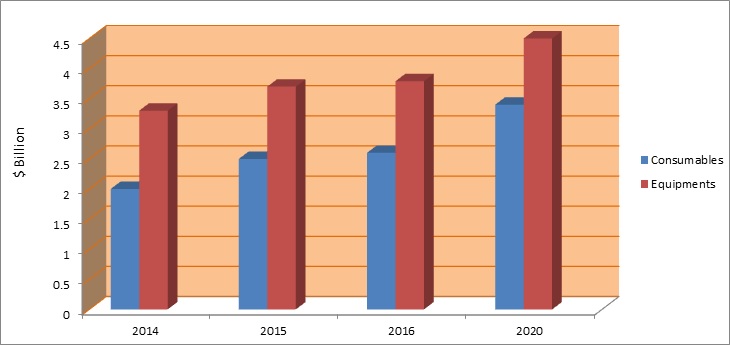
According to market study of Microbiology Equipment and Consumables from market research, the microbiology equipment and consumables market together reached $9.8 billion revenue in 2015 and it estimates that more than 90,000 industrial plants worldwide conduct close to 2 billion tests each year. The market should reach nearly $12.3 billion by 2020, increasing at a compound annual growth rate (CAGR) of 4.6% from 2015 to 2020. The microbiology market is large and growing, the second largest diagnostics market after clinical diagnostics in test volume and market value. The market for equipment reached $3.6 billion in 2015, and should reach over $4.5 billion in 2020, from 2015 to 2020.
GLOBAL MARKET SHARES OF BIOPESTICIDES AND SYNTHETIC PESTICIDES
Global Market for Pesticides report provides the reader with a detailed analysis of the global bio-pesticide industry. It also discusses technological developments, future trends and emerging opportunities. This market report organizes information from diverse sources into a cohesive unit that includes a pesticide (synthetic and biopesticide) overview, organic farming and production overview, industry structure, and technology and patents sections.
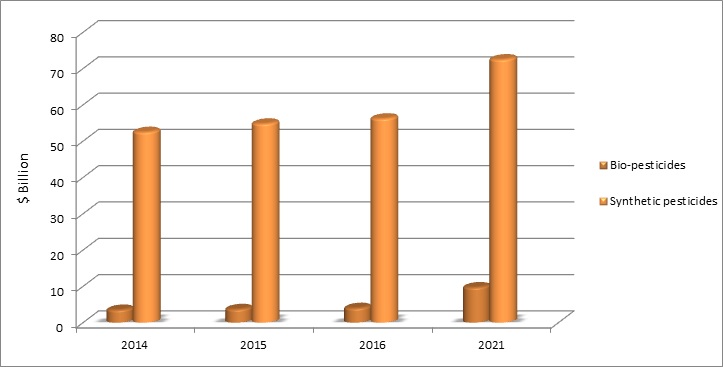
The global market for biopesticides and synthetic pesticides reached $58.5 billion in 2015. The market should reach $60.2 billion in 2016 and $78.7 billion by 2021, growing at a compound annual growth rate (CAGR) of 5.5% from 2016 to 2021. The global market for synthetic pesticides reached $54.8 billion in 2015. The market should reach $56.2 billion in 2016 and $71.0 billion by 2021. The global biopesticides market reached $3.7 billion in 2015. The market should reach nearly $4.0 billion in 2016 and $7.9 billion by 2021.
GLOBAL MARKETS: INFECTIOUS DISEASE TREATMENTS
The infectious disease treatments’ market report organizes information from diverse sources into a cohesive unit that includes an overview, global implications of infectious diseases, infectious diseases by type, treatment and prevention, emerging pharmaceutical and industrial products, and an applicable patents section. Information is organized by type of infectious disease (i.e., bacterial, viral, parasitic, and fungal) and appropriate treatments, both current and anticipated. The below report was prepared with marketing and sales personnel and investors in mind. The audience will obtain a broad view of the social and economic consequences of infectious diseases.
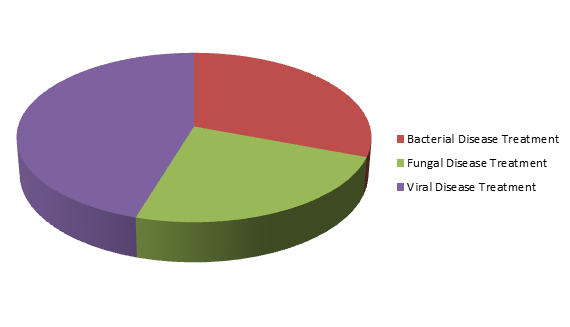
The global market for infectious disease treatments was valued at $90.4 billion in 2009. This market is expected to increase at a compound annual growth rate (CAGR) of 8.8% to reach $138 billion in 2014. The largest market share belongs to antibiotic treatments for bacterial and fungal diseases at 53% of the total infectious disease treatment market. Fungal disease treatments will experience a slightly higher compound annual growth rate (CAGR) of 6.2%, from $4.6 billion in 2009 to $6.2 billion in 2014. Viral disease treatments will have the fastest compound annual growth rate (CAGR) of 12.1%, increasing from nearly $45 billion in 2009 to $79 billion in 2014.
GLOBAL ANALYSIS OF MICROBIAL IDENTIFICATION
Microbial identification is the process of identifying harmful bacteria and fungi that may contaminate raw materials, manufacturing facilities and branded products. Accurate and definitive microbial identification is critical for disease diagnosis and treatment of infections. Bacterial identification is widely used across manufacturing facilities, clinical settings and environmental studies. The global market for microbial identification has been segmented into consumables, instruments & software and services. Consumables segment account for products that include reagents, plates, media and other consumables. The report segments this market on the basis of products, methods, applications, end users, and geographies.
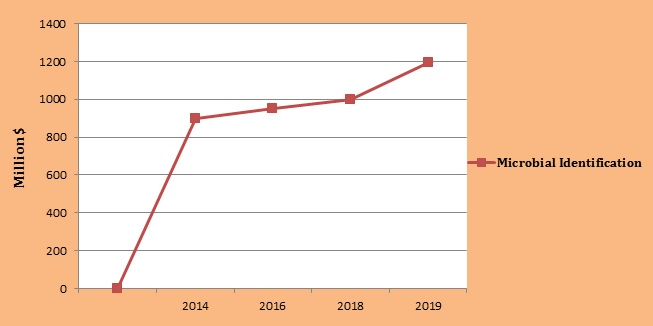
The global microbial identification market is estimated at $896.5 million in 2014 and is expected to reach $1,194.1 million by 2019, growing at a CAGR of 5.9% from 2014 to 2019.
Conference Highlights
- Potential Use of Beneficial Microorganisms
- Microbial Association-Microbial Interactions
- Host Microbe Interactions
- Probiotics-Prebiotics Research
- Microbial Ecology
- Microbial Diversity
- Plant-Microbe Interactions
- Environmental Microbiology
- Microbial Diseases and Epidemiology
- Agricultural Microbiology
- Microbial Mechanisms of Pathogenicity
- Microbes of Water Ecosystem
- Industrial Use of Microbes
- Soil Microbiology
- Microbial Biotechnology
- Biofilm Formation
- Microbes in Biogeochemical Models
- Beneficial Microbes in Food Technology
- Forest Microbiology
- Biodegradation
- Bioremediation
- Microbiology in Medical, Pharmaceutical and Cosmetic Industry
To share your views and research, please click here to register for the Conference.
To Collaborate Scientific Professionals around the World
| Conference Date | July 17-18, 2017 | ||
| Sponsors & Exhibitors |
|
||
| Speaker Opportunity Closed | Day 1 | Day 2 | |
| Poster Opportunity Closed | Click Here to View | ||
Useful Links
Special Issues
All accepted abstracts will be published in respective Our International Journals.
- Applied Microbiology: Open Access
- Clinical Microbiology: Open Access
- Journal of Medical Microbiology & Diagnosis
Abstracts will be provided with Digital Object Identifier by










